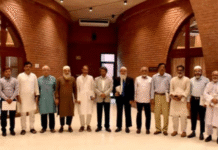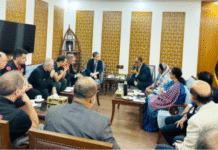 Speakers at a dialogue here on Wednesday stressed introducing proper transport connectivity and effective linkages among the South and South Western countries, aiming to foster economic growth and enhance aggregate regional trade.
Speakers at a dialogue here on Wednesday stressed introducing proper transport connectivity and effective linkages among the South and South Western countries, aiming to foster economic growth and enhance aggregate regional trade.
They said an effective transport network directly contributes to the key development and poverty reduction strategies, and Bangladesh as well as other countries in the region could be benefited by introducing an interconnected transport system, which is conducive to socioeconomic development.
United Nations Economic and Social Commission for Asia and Pacific (UNESCAP) and Bangladesh Institute of International and Strategic Study (BIISS) jointly organised the two-day policy dialogue on ‘Strengthening Transport Connectivity among the South and South-West countries’ at Sonargaon Hotel in the capital.
PM’s Economic Adviser Dr Mashiur Rahman read out the keynote paper on connectivity, economic welfare and foreign policy paradigm at the inaugural session of the dialogue.
Chaired by chairman of BIISS’ Board of Directors ambassador Munshi Faiz Ahmad, the inaugural session was also addressed by PM’s Defence Adviser Major General (retd) Tarique Ahmed Siddique and BIISS DG Major General Sajjadul Haque.
In his keynote presentation, Dr Mashiur Rahman said connectivity, including transit, should be seen in the context of long–term cooperation on a board front, which includes several sectors of the economy. “It’s aimed at progress towards the concept of common economic space and argues for large cross-border investment in relatively small economies.”
He said transit is, in fact, welfare enhancing for all cooperating countries, and it arguments public revenue and public savings, which will be available for other priority public expenditures.
The Economic Adviser said Bangladesh and India should start consultations with Bhutan and Nepal for replacing current agreements by trilateral agreements, having India as a common contracting party, which should accelerate the removal of trade-obstacle rules and procedures.
“Bangladesh and India may rethink the utility of the current short-term bilateral trade and transit agreements, which impedes investment in development of infrastructure for transit and thus creates the binding constraints,” he said.
Dr Mashiur said Bangladesh and India have to adopt an effective strategy for making operational the Joint Communiqué and Framework Agreement and more effective communication with Bhutan, Nepal and Myanmar.
Tarique Ahmed said it is estimated that the South and South West Asia have grown at 7.5 percent in 2010 as compared to 3.9 percent in 2009. Revival in investment and private consumption, growth in export, rise in industrial production and improved performance by agriculture sector helped achieve such strong growth.
He said it is agreed by almost all economists and politicians that facilitation of connectivity would help all the countries of the region continue economic development and face emerging development challenges.
The Defence Adviser said a psychological barrier is prevailing in the region towards establishing a regional connectivity, but it should be removed in the greater interest of the nation.
Ambassador Munshi Faiz Ahmad emphasised the importance of connectivity on global and regional agenda as a tool for promoting trade and commerce, and enhancing interaction, cooperation and understanding among the people in different countries in the region.









